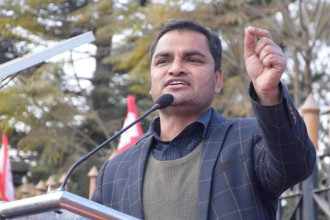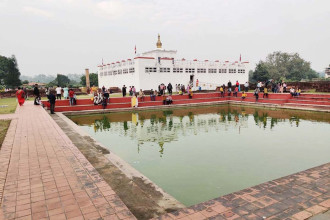KATHMANDU: The World Trade Organization (WTO) Chairs Programme Nepal and Kathmandu University (KU) began 'WCP Nepal - AIB South Asia Conference 2024' in Kathmandu today.
The two-day international conference with the slogan 'Global Trade and South Asia: Competitiveness, Value Chains, and environmental, social and governance (ESG)' has been organised to discuss South Asia's competitiveness in global trade, supply chain, and environmental and social aspects.
Addressing the conference, KU Registrar Prof Achyut Wagle highlighted the need for Nepal to adopt a different trade policy as Nepal is in the process of graduating from a least developed country (LDC). Wagle suggested that Nepal should focus on the production including raw materials, to compete in the global market.
AIB-SAC Executive Board, Indian Institute of Management, Bangalore, India, Chair Prof S Raghunath stated that the conference will play a crucial role in formulating policies related to foreign trade in South Asian countries. He mentioned that to build a smooth supply chain, countries are interdependent worldwide, and equal participation and contribution from all will be necessary. Raghunath emphasized the importance of maximising the use of innovation and intellectual rights in promoting local-level production.
Secretary of the Ministry of Industry, Commerce and Supplies, Narayan Prasad Sharma Duwadee, said the government will take the suggestions from researchers and scholars positively and take initiatives to implement them to bridge the policy gap seen in promoting Nepal's foreign trade in a balanced manner. He stated that expertise in various fields is necessary for effective policy-making. He stressed the need to solve the problems seen at the policy, structural, and implementation levels necessary to build a global supply chain and make Nepali goods competitive in the international market. He said that Nepal is working strategically to manage various facilities that will be lost in the business sector after graduation from LDC. He emphasized that a competitive market should be created by increasing internal productivity to achieve sustainable development goals (SDGs).
Ambassador of Nepal, Permanent Mission to UN, Geneva, Ram Prasad Subedi, mentioned that foreign trade is the engine of development and prosperity, and added that South Asia is a significant part of the world market. He emphasized the need to diversify products and markets to solve the problem of high trade deficit faced by countries including Nepal. Since Nepal and Bangladesh are graduating together from LDCs in South Asia, discussions are being held at different levels in the United Nations for the continuation of the facilities — duty-free and quota-free — including zero customs, which are currently being enjoyed in the field of trade even after graduation, Subedi said.
He opined that import management will be easier if capital can be built, and stressed the need to make Nepal's trade policy timely.
WTO Deputy Director General Xiangchen Zhang said that capacity development is being done with various sectors and levels to facilitate world trade. Adding to the context of recent changes in the scenario of world trade, he also promised that initiatives will be taken for the continuation of facilities related to the trade of LDCs. He also said that the issue related to climate change and environmental risk reduction should be taken seriously by the global community.
KU Vice-Chancellor Prof Bhola Thapa mentioned that the dimensions of business are changing at both the regional and global levels, and as a result, import-dependent and small economy countries like Nepal are being affected more. He stated that everyone’s efforts are needed to solve such a problem. Thapa said that due to low production, Nepal’s export part is weaker and also added that Nepal has not taken sufficient advantage of WTO facilities. Thapa also opined that research and mutual discussion will contribute to better policy-making.
Head of Kolkata Campus, Indian Institute of Foreign Trade, Kolkata, K Rangarajan, said that although there is a high demographic advantage in the South Asia region, it has not taken proper advantage in the field of trade. Mentioning that South Asia is facing various challenges in regional and world trade, he said that the possibility of bringing the products of this region to the international market through the highest use of the latest technology should be taken seriously.
Association of Indian Universities (AIU) Secretary General Pankaj Mittal said that international affiliation can be maintained through various programmes of educational studies.
More than 60 experts, researchers, and academic personalities from seven different countries have participated in the conference.
The two-day conference will present research papers on various topics.



-1770354715.jpeg)


-1770295070.jpeg)